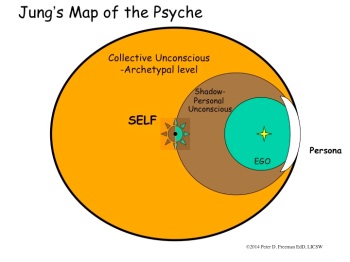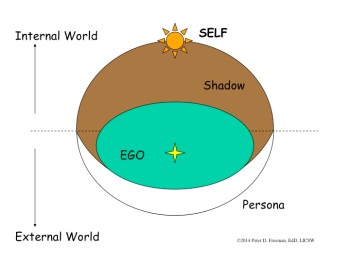The Unconscious is all that which is not conscious. The fullness of the psyche is quite simply unfathomable. It is symbolically thought of as the depths, the sea, the darkness, dark forest, the Great Mother, God itself. Unconsciousness is the ground from which consciousness rises and to which it returns. We develop greater consciousness out of an unconscious state. We incarnate into consciousness, as it were, potentialities that lie within the Unconscious. The emergence of consciousness is easy to witness in the development of children.
Jung described two layers of the unconscious, the Personal and the Collective. The Personal Unconscious is the accumulated memories, experiences, thoughts, perceptions, and feelings that have fallen out of conscious awareness through forgetting, repression, or because they lack the energy necessary to be perceived. This is the vast accumulated stuff of a lifetime that is subjective in nature. Clients in therapy, often come to see me to work through this material. There is always a deeper, not personal, level operating for all of us, the ground of being.
The Collective Unconscious is the great depth or vastness of the psyche. It is the nonpersonal, objective psyche common to all human beings. It is here the universals of mankind exist that manifest subjectively in different particular, idiosyncratic ways. The Collective Unconscious is the ultimate source from which consciousness emerges; it is not a by-product of individual consciousness or experience. To Jung, the entire structure of the human psyche and dynamic patterns for psychological development and growth have their origins in this deep primordial level. From the universal objective psyche, the individual subjective psyche emerges.
The Collective Unconscious is the supra-personal foundation, the ground, of both the personal unconscious and consciousness, and is complete in its nature, containing both the negative and positive, thesis and antithesis, what have you, and is unaffected by the directions or judgments of the conscious psyche. The conflicted polarities of human Ego consciousness exist as wholes at this level. The filtering of Unconscious polarities through the conscious Ego determines the positive or negative value of any given polarity (see A Principle of Opposites).
These roots or dominants within the Collective Unconscious are what Jung referred to as archetypes and are, in effect, the universal operating programs, the human software shared by every human being. While archetypes generate psychological images and patterns of behavior, they are not experienced directly, as such, but in the manifestations of their effects.
Because of the bottomless depth of the Unconscious, all human possibility is potentially experienced given the right conditions of biology, personality, gender, or other triggering condition or event, and, by far, mostly never can or ever will be experienced directly. Those possibilities will be given different expression varying from individual to individual, group to group, culture to culture, circumstance to circumstance, but will at root have the same source in the Collective Unconscious. Although individuals, groups, and cultures may look different in their specifics, look beyond and through the particulars and you will see the common archetypal patterns in action.

(Jung, 1973, 1977; Stevens, 2003).
See Bookshelf for complete citations.
Posted in
Analytical Psychology,
Archetypes,
C. G. Jung,
Collective Unconscious,
Jungian,
Lexicon,
Psyche,
Psychology,
Unconscious and tagged
Analytical Psychology,
Archetypes,
C. G. Jung,
Collective Unconscious,
Conscious,
lexicon,
Psyche,
psychology,
Unconscious






